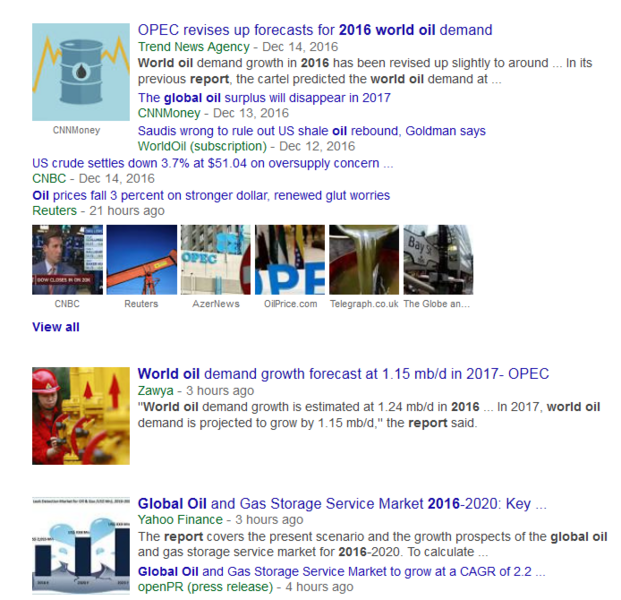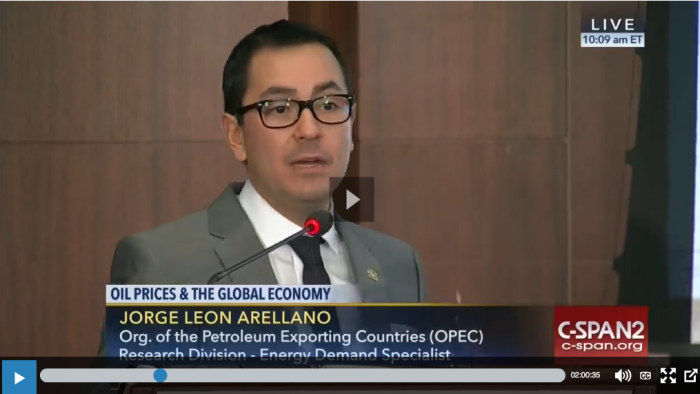File:World Oil Report - Dec2016.png

Original file (694 × 670 pixels, file size: 203 KB, MIME type: image/png)
http://oilprice.com/Energy/Energy-General/OPEC-Expect-Oil-Markets-To-Rebalance-In-H2-2017.html
http://www.reuters.com/article/us-global-oil-idUSKBN141017
http://www.reuters.com/article/us-global-oil-idUSKBN141017
SAUDIS VS. SHALE: BOTH CLAIM VICTORY AFTER OPEC DEAL
After a two-year battle for oil-market dominance, Saudi Arabia and U.S. shale producers are licking their wounds but also both see themselves as winners, reports The Wall Street Journal.
The Organization of the Petroleum Exporting Countries agreed to a deal last month to cut global production by almost 2% but only after crude prices more than halved since their peak in 2014. The oil cartel had flooded the market with oil to drive down prices and force out competitors who depend on crude commanding top dollars, but the strategy proved costly for all.
Two years ago, many shale oil producers could only operate with crude at about $80 a barrel, and some were decimated as prices fell. The Saudi-led cartel OPEC now has a oil-market share of almost 42% of global supply, after it fell below 40% in 2014, according to the International Energy Agency.
It was a bruising fight for Saudi Arabia, where economic growth fell and popular subsidies were cut to balance the national budget. A rematch may be in the works. During the downturn, shale producers made technological upgrades and slashed production costs. Now the Americans won’t blink at $50-$60 dollar oil.
BAD NEWS FOR THE OPEC DEAL: LIBYA’S PRODUCTION RETURNS, IRAQ TO RAMP UP EXPORTS AND OPEC PLEADS FOR ASSISTANCE FROM NON MEMBERS
OPEC’s deal to cut global output won’t be implemented until Jan. 1 but the bad news for the deal is already piling up.
Libya has opened up a key pipeline and restarted pumping oil at two fields in the Western part of the country that had previously been shut down because of hostilities.
An increase in Libyan output of 400,000 barrels a day would almost completely make up for the barrels that Saudi Arabia agreed to cut as part of OPEC’s agreement to reduce a global glut and boost prices. Libya is exempt from the deal and is allowed to ramp up its production.
Iraq which is party to the output cut has been circulating a post-deal document that details its plans to increase oil shipments from the Basra region by 7%, raising questions about the country’s commitment to curbing supply.
In response to the burgeoning problem OPEC’s Secretary General Mohammad Barkindo said he would take unprecedented action and ask cartel members in writing to announce their future oil-export programs.
The oil cartel previously warned it would need everyone including non-OPEC producers to follow through on their pledge to cut production to successfully tackle the global oil glut.
SHELL’S SIMON HENRY STEPS DOWN, WHILE EXXON FACES DILEMMA ON TILLERSON’S PAY
Royal Dutch Shell PLC on Thursday said its Chief Financial Officer Simon Henry will step down after having captained the Anglo-Dutch oil major through the downturn in oil and the purchase of BG Group, report Sarah Kent and Rory Gallivan.
Mr. Henry will be replaced by a rare American recruit Jessica Uhl who is currently the finance chief for the company’s gas division. Mr. Henry’s departure in March puts an end to a 30 year career at Shell that culminated with the company’s roughly $50 billion takeover of BG.
Meanwhile, Exxon Mobil Corp. faces a difficult decision over whether to grant Chief Executive Rex Tillerson, the nominee for secretary of state, more than $175 million in retirement related stock compensation.
Mr. Tillerson becomes eligible to receive the compensation when he turns 65 next March but Exxon is debating whether to award his compensation early following his nomination as secretary of state by President-elect Donald Trump.
Allowing Mr. Tillerson to retire prematurely and cash out would be a break from company policy under which payouts occur after a decade to encourage executives to consider long term returns.
But awarding Mr. Tillerson the money now could be seen as influence peddling as he could take actions in his role as secretary of state that could benefit Exxon.
Mr. Trump’s nominees could receive heavy scrutiny from lawmakers during the confirmation process because of concerns about the candidates having conflicts of interest.
MARKETS
Crude prices edged up on Thursday despite the U.S. Federal Reserve raising interest rates and a round of early morning sell-offs prompted by bearish OPEC data.
The February contract for global crude oil benchmark Brent was up 0.98% at $54.43 while its U.S. counterpart West Texas Intermediate gained 0.59% to $51.34 for January deliveries. Overnight, the U.S. Federal Reserve raised interest rates for the first time in a year, putting some early pressure on commodities markets.
....
https://en.m.wikipedia.org/wiki/List_of_countries_by_oil_consumption
http://www.opec.org/opec_web/static_files_project/media/downloads/publications/ASB2015.pdf
- In 2014, world crude oil production averaged at 73.4 million barrels/day, increasing by 0.7 per cent, over 2013
....
https://en.wikipedia.org/wiki/List_of_countries_by_oil_production
File history
Click on a date/time to view the file as it appeared at that time.
| Date/Time | Thumbnail | Dimensions | User | Comment | |
|---|---|---|---|---|---|
| current | 17:33, 15 December 2016 |  | 694 × 670 (203 KB) | Siterunner (talk | contribs) |
You cannot overwrite this file.
File usage
The following page uses this file:
- Atmospheric Science
- Biosphere
- Citizen Science
- Divestment from Fossil Fuels
- Eco-nomics
- EOS eco Operating System
- Earth360
- EarthPOV
- Earth Observations
- Earth Science
- Environmental Protection
- Environmental Security
- Environmental Security, National Security
- Fossil Fuels
- Global Security
- Green Energy Initiatives
- Green Graphics
- INDC
- Media
- Natural Resources
- Networking
- New Space
- Ocean Science
- Planet Citizen
- Planet Scientist
- Planet Citizens, Planet Scientists
- Renewable Energy
- Sea-Level Rise & Mitigation
- Solar Energy
- ThinBlueLayer
- Whole Earth

